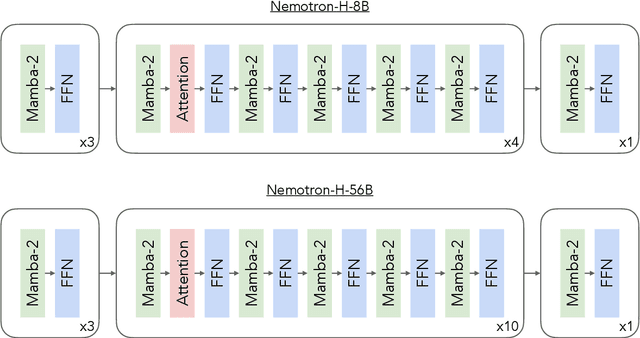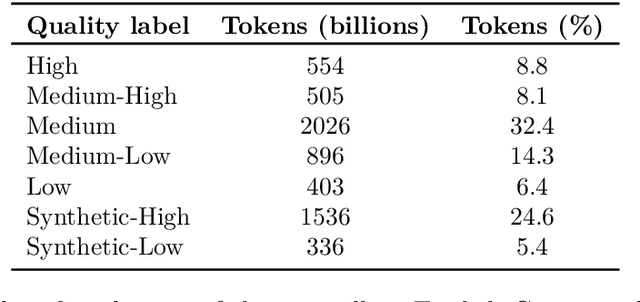Jason Lu
Nemotron-H: A Family of Accurate and Efficient Hybrid Mamba-Transformer Models
Apr 10, 2025



Abstract:As inference-time scaling becomes critical for enhanced reasoning capabilities, it is increasingly becoming important to build models that are efficient to infer. We introduce Nemotron-H, a family of 8B and 56B/47B hybrid Mamba-Transformer models designed to reduce inference cost for a given accuracy level. To achieve this goal, we replace the majority of self-attention layers in the common Transformer model architecture with Mamba layers that perform constant computation and require constant memory per generated token. We show that Nemotron-H models offer either better or on-par accuracy compared to other similarly-sized state-of-the-art open-sourced Transformer models (e.g., Qwen-2.5-7B/72B and Llama-3.1-8B/70B), while being up to 3$\times$ faster at inference. To further increase inference speed and reduce the memory required at inference time, we created Nemotron-H-47B-Base from the 56B model using a new compression via pruning and distillation technique called MiniPuzzle. Nemotron-H-47B-Base achieves similar accuracy to the 56B model, but is 20% faster to infer. In addition, we introduce an FP8-based training recipe and show that it can achieve on par results with BF16-based training. This recipe is used to train the 56B model. All Nemotron-H models will be released, with support in Hugging Face, NeMo, and Megatron-LM.
Semi-Supervised Learning with Multiple Imputations on Non-Random Missing Labels
Aug 15, 2023



Abstract:Semi-Supervised Learning (SSL) is implemented when algorithms are trained on both labeled and unlabeled data. This is a very common application of ML as it is unrealistic to obtain a fully labeled dataset. Researchers have tackled three main issues: missing at random (MAR), missing completely at random (MCAR), and missing not at random (MNAR). The MNAR problem is the most challenging of the three as one cannot safely assume that all class distributions are equal. Existing methods, including Class-Aware Imputation (CAI) and Class-Aware Propensity (CAP), mostly overlook the non-randomness in the unlabeled data. This paper proposes two new methods of combining multiple imputation models to achieve higher accuracy and less bias. 1) We use multiple imputation models, create confidence intervals, and apply a threshold to ignore pseudo-labels with low confidence. 2) Our new method, SSL with De-biased Imputations (SSL-DI), aims to reduce bias by filtering out inaccurate data and finding a subset that is accurate and reliable. This subset of the larger dataset could be imputed into another SSL model, which will be less biased. The proposed models have been shown to be effective in both MCAR and MNAR situations, and experimental results show that our methodology outperforms existing methods in terms of classification accuracy and reducing bias.
 Add to Chrome
Add to Chrome Add to Firefox
Add to Firefox Add to Edge
Add to Edge